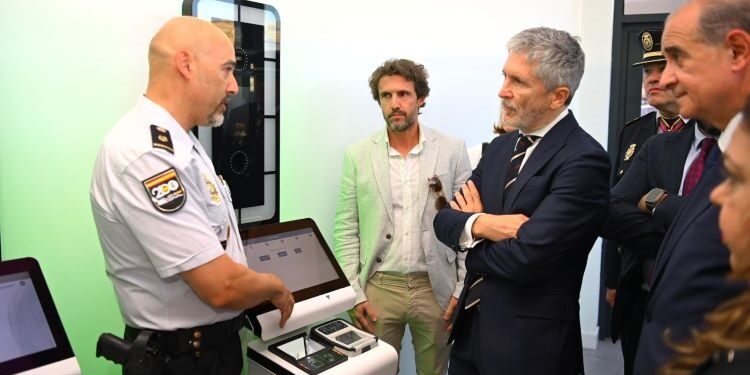Eduardo González
The Minister of the Interior, Fernando Grande-Marlaska, announced yesterday in Ceuta the completion of the infrastructure of the El Tarajal pass and assured that the “smart border” will be fully operational “before the end of the year”, in accordance with the forecasts and deadlines. established by the European Union.
The minister made this announcement during his visit to Ceuta to see first-hand the new facilities at the border post of the autonomous city of Ceuta. “After six years of work and more than 22 million of investment, Ceuta today has a modern border post adapted to the needs and requirements of the EU, which will benefit the autonomous city and the entire population of Ceuta,” declared the minister, accompanied, among other authorities, by the Government delegate in Ceuta, Cristina Pérez, and by the Director General of Police, Francisco Pardo.
Grande-Marlaska toured the facilities of the three new terminals enabled at the border crossing for the entry and exit of pedestrians and vehicles and received explanations about the reorganization of the spaces to facilitate greater efficiency and speed of movements. The work includes a comprehensive adaptation of the infrastructure, which affects the interior spaces and the surveillance systems, electricity generation, telecommunications and security, as reported by the Ministry in a press release.
The minister confirmed the implementation of the Entry/Exit system (EES), known as “smart border”, which has received 7.5 million euros from the investment made in El Tarajal. The EES establishes an agile passage system to facilitate the passage of cross-border workers and Spanish residents in the areas of influence of Tetouan. Closed-circuit television systems and automatic license plate identification systems have also been modernized.
Among other improvements, the border crossing facilities have new people detector equipment, metal arches, luggage scanners, identification systems for rapid fingerprint search, manual metal detectors and access control systems.
On April 23, the Minister of Foreign Affairs, José Manuel Albares, received the president of Ceuta, Juan Vivas, at the ministerial headquarters of the Viana Palace in Madrid, with whom he discussed the operation of the Ceuta border in its “condition of external border of the European Union” and the “current commitment” of the Government to achieve the opening of a commercial customs.
The meeting took place just over two years after the signing in Rabat of the road map between the President of the Government, Pedro Sánchez, and the King of Morocco, Mohamed VI, by virtue of which the two governments committed to opening a customs office on the border of El Tarajal, the first in the history of Ceuta. Vivas himself reminded Albares of this commitment during his previous meeting, which took place in Madrid in mid-February 2023.
In mid-February, Pedro Sánchez assured during his official trip to Morocco that he was confident that “soon” there would be “significant progress” in the process of opening land customs in Ceuta and Melilla, because it is an “essential part of our bilateral agenda.” ” and because it will “promote transparent and regular trade that should benefit neighboring regions.”
However, Sánchez did not obtain any specific commitment from the Moroccan authorities in this regard, nor had Albares achieved it during his last trip to Rabat, which took place last December and in which he assured the Moroccan Government that, for part of Spain, “everything is ready so that land customs with Ceuta and Melilla can begin to operate” and, therefore, “no more pilot tests are necessary” (in reference to the three pilot tests carried out in January, February and May 2023).
Until the COVID-19 pandemic, an exceptional regime governed the Schengen Treaty in Ceuta by which residents in the Moroccan province of Tetouan were allowed to enter Ceuta only with their passport. The restrictions imposed after the pandemic have been regularly ratified in the BOE, but the Government of Ceuta has repeatedly defended the permanent maintenance of the visa requirement for the El Tarajal crossing in order to improve control of people who enter. to the Autonomous City.







